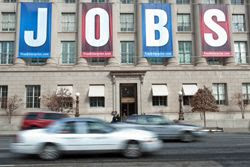 Noting that India's direct investment in the US has grown by an average of 33 percent each year since 2005, a top US official has acknowledged that Indian companies employ tens of thousands of Americans.
Noting that India's direct investment in the US has grown by an average of 33 percent each year since 2005, a top US official has acknowledged that Indian companies employ tens of thousands of Americans.In the decade between 2000 and 2010, Indian investment has increased from a negligible $96 million to over $3.3 billion, deputy secretary of state Bill Burns said at the 3rd FICCI-Brookings Dialogue on 'Is there a future of India-US strategic dialogue' here Tuesday.
India-US bilateral economic relationship is anchored in the realisation that their long-term interests are essentially congruent and mutually reinforcing, he said at the event organised by the Federation of Indian Chambers of Commerce and Industry with the Washington think tank.
'Together, we are drawing the best from both of our societies to make better products that compete and win in the global economy,' Burns said noting Tata Steel has a plant in Ohio, while Boeing uses engineers in Bangalore to design 787s whose parts are manufactured across America.
Noting 'the modernisation of India and the lifting up of hundreds of millions of Indians out of poverty necessarily remains the focus of the Indian government', he said India has no more important partner than the US in this endeavour.
'This extraordinary -- and so far extraordinarily successful -- effort requires India to sustain its high rate of economic growth, open markets for its goods and services, and attract the investment needed to realise its vision of inclusive development,' he said.
'There is no more important partner for India in this endeavour than the United States,' Burns said.
Over the past decade, India-US bilateral trade has doubled and then almost doubled again, he said while US total direct investment in India rose 10-fold, from $2.4 billion in 2000 to $27.1 billion in 2010, he noted.
India-US bilateral economic relationship is anchored in the realisation that their long-term interests are essentially congruent and mutually reinforcing, he said at the event organised by the Federation of Indian Chambers of Commerce and Industry with the Washington think tank.
'Together, we are drawing the best from both of our societies to make better products that compete and win in the global economy,' Burns said noting Tata Steel has a plant in Ohio, while Boeing uses engineers in Bangalore to design 787s whose parts are manufactured across America.
Noting 'the modernisation of India and the lifting up of hundreds of millions of Indians out of poverty necessarily remains the focus of the Indian government', he said India has no more important partner than the US in this endeavour.
'This extraordinary -- and so far extraordinarily successful -- effort requires India to sustain its high rate of economic growth, open markets for its goods and services, and attract the investment needed to realise its vision of inclusive development,' he said.
'There is no more important partner for India in this endeavour than the United States,' Burns said.
Over the past decade, India-US bilateral trade has doubled and then almost doubled again, he said while US total direct investment in India rose 10-fold, from $2.4 billion in 2000 to $27.1 billion in 2010, he noted.

